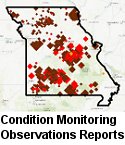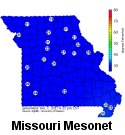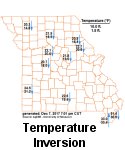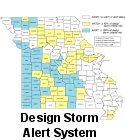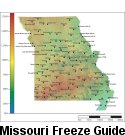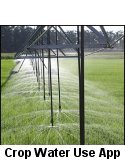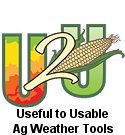
Wet weather can cause seeds to sprout on the plant
Linda Geist
Writer
University of Missouri Extension
September 21, 2016
COLUMBIA, Mo. - Farmers may see sprouting of corn and soybean seed where there has been a combination of rain and high temperatures, says University of Missouri Extension agronomist Bill Wiebold.
Missouri row crops saw both this growing season. MU Extension climatologist Pat Guinan says August 2016 in Missouri was the fifth wettest August on record since 1895 and the wettest August since 1982. This year also saw the wettest July-August period in more than a century.
High summer dew points combined to set the stage for rapid sprouting. Wiebold says germination, or sprouting, can occur within a couple of days with temperatures in the 80s.
Normally, cornhusks protect mature kernels from moisture that may cause germination, he says. If corn ears turn downward at maturity, husks shed water and almost eliminate chances of sprouting. In normal years, grain dries as it matures to moisture levels far below 30-50 percent, when sprouting occurs.
However, if ears remain pointed upward, water from rain or heavy dew can run inside the husk and pool at the butt end of the ear. The husks trap water near the kernels. If temperatures are above 50 degrees, kernels likely will germinate.
Sprouting is usually limited to several rows of kernels at the butt end of the ear. This year's heavy rainfall increases chances that kernels higher on the ear receive damage.
Soybean pod walls prevent mature soybean seeds from absorbing water. The pod walls shed rainwater. "Frequent rains, continuous drizzle, or foggy days and nights can bathe the soybean pod in enough water that the water soaks through the pod wall and wets the soybean seed," Wiebold says.
More commonly, pod walls split or break. This allows water to enter the pod and reach the soybean seeds. During wetting and drying cycles, mature soybean seeds expand and contract. Expanding seeds put pressure on the pod wall to open the two halves of the pod. If the seed dries and shrinks, the seed may fall from the pod in a process known as shattering. If it remains wet, the seed remains swollen and does not fall. However, it may germinate if it stays wet and warm enough.
Premature sprouting reduces grain quality and safe storage time. The soybean seed coat and the corn kernel pericarp rupture during germination. This gives fungus and insects an opening to invade the seed. Germinated seeds also may crack during combining. Debris from sprouted seeds also accumulates in the center of a bin and may be a fire hazard.
Wiebold recommends timely harvest of sprouting crops and quick drying of grain to stop further germination and deterioration. He also suggests screening grain to remove debris before storage.
Expect docked prices of sprouted, cracked seed when selling, Wiebold says.
Source: William Wiebold, 573-673-4128 (cell), 573-882-0621; Pat Guinan, 573-882-5908


